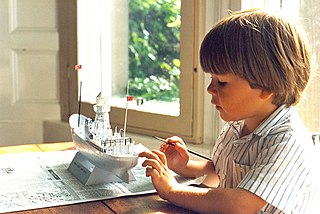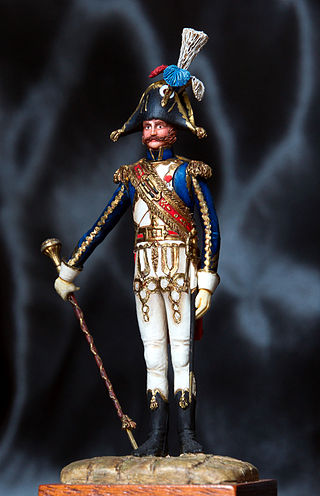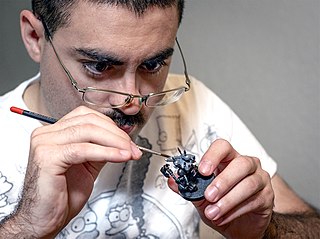
A model car, or toy car, is a miniature representation of an automobile. Other miniature motor vehicles, such as trucks, buses, or even ATVs, etc. are often included in this general category. Because many miniature vehicles were originally aimed at children as playthings, there is no precise difference between a model car and a toy car, yet the word 'model' implies either assembly required or the accurate rendering of an actual vehicle at smaller scale. The kit building hobby became popular through the 1950s, while the collecting of miniatures by adults started to pick up momentum around 1970. Precision-detailed miniatures made specifically for adults are a significant part of the market since the mid-1980s.

Matchbox is a popular toy brand which was introduced by Lesney Products in 1953, and is now owned by Mattel, Inc, which purchased the brand in 1997. The brand was given its name because the original die-cast "Matchbox" toys were sold in boxes similar to those in which matches were sold. The brand grew to encompass a broad range of toys, including larger scale die-cast models, plastic model kits, slot car racing, and action figures.

A scale model is a physical model which is geometrically similar to an object. Scale models are generally smaller than large prototypes such as vehicles, buildings, or people; but may be larger than small prototypes such as anatomical structures or subatomic particles. Models built to the same scale as the prototype are called mockups.

Airfix is a British brand and former manufacturing company which produced injection-moulded plastic scale model kits. In the UK, the name 'Airfix' has become practically synonymous with plastic models of this type, often simply referred to as "an airfix kit" even if made by another manufacturer.

A plastic model is a plastic scale model manufactured as a kit, primarily assembled by hobbyists, and intended for static display. A plastic model kit depicts various subjects, with a majority depicting military and civilian vehicles. A kit varies in difficulty, ranging from a "snap-together" model that assembles straight from the box, to a kit that requires special tools, paints, and cements.

In miniature wargaming, players enact simulated battles using scale models called miniature models, which can be anywhere from 2 to 54 mm in height, to represent warriors, vehicles, artillery, buildings, and terrain. These models are colloquially referred to as miniatures or minis.
Military miniaturism is a niche within the broader hobby of modeling focusing on military subjects. It is itself a rather broad subject, dealing with any scale model of military theme. It has an ever growing range of sub-hobbies, including scale figure modeling, armour modeling, model ship building, military aviation modeling, and historical wargaming.
Model military vehicles range in size and complexity; from simplified small-scale models for wargaming, to large, super-detailed renditions of specific real-life vehicles.

A model figure is a scale model representing a human, monster or other creature. Human figures may be either a generic figure of a type, a historical personage, or a fictional character.

Figure painting, or miniature painting, is the hobby of painting miniature figures and/or model figures, either as a standalone activity or as a part of another activity that uses models, such as role-playing games, wargames, or military modeling.

A die-cast toy is a toy or a collectible model produced by using the die-casting method of putting molten lead, zinc alloy or plastic in a mold to produce a particular shape. Such toys are made of metal, with plastic, rubber, glass, or other machined metal parts. Wholly plastic toys are made by a similar process of injection molding, but the two methods are distinct because of the properties of the materials.

Maisto is a brand of scale model vehicles introduced and owned by May Cheong Group, a Chinese company founded in 1967 in Hong Kong by brothers P.Y. Ngan and Y.C Ngan. The company has also subsidiaries in the United States, France, and China. MCG also owns other model car brands such as Italian former company Bburago and Polistil.
1:144 scale is a scale used for some scale models such as micro/mini armor. 1:144 means that the dimensions of the model are 1/144 (0.00694) the dimensions of the original life-sized object; this equates to a scale of 1/2 inch per 6 feet of original dimension. For instance, an airplane 30 feet (9.14 m) in length would be a mere 2.5 inches (63.5 mm) long as a 1:144 scale model.
AUTOart is a Hong Kong-based diecast model car line manufactured by Gateway Autoart Ltd. and sold by AA Collection Ltd.

1:64 scale is a traditional scale for models and miniatures, in which one unit on the model represents 64 units on the actual object. It is also known as "three-sixteenths scale", since 3/16 of an inch represents one foot. A human is approximately 1+1⁄16 inches (27 mm) tall in 1:64 scale. The scale originated by halving the very common 1:32 scale, which was known as "standard size" in some hobbies.

1:24 scale is a size for automobile models such as injection-molded plastic model kits or metal die-cast toys, which are built and collected by both children and adults. 1:24 means that a unit of measurement, such as one inch or one centimeter, on the model represents 24 units on the actual object. An example would be one inch of length on a model automobile would represent 24 inches on the real vehicle. Primarily automobile models are made in this scale, with a few examples of tractor trailers and other larger equipment. In the United States there is a very minor variation of the 1:24 scale, where many automobile plastic model kits are scaled at 1:25.
Nürnberger Zinkdruckguß-Modelle GmbH is a German manufacturer of diecast scale models primarily in 1:50 scale for use both as toys and promotional models mainly by heavy transport and construction equipment manufacturers.
1:72 scale is a scale used for scale models, most commonly model aircraft, corresponding to one sixth of an inch representing one foot. In other words, 72 of a given model placed end to end would represent the length of the real thing. In this scale, a man who is six feet tall would be exactly one inch in height. The scale was popular for aircraft because small fighters and large bombers were represented, and was practically the only choice of scale if a modeler wanted to have all aircraft types represented in the same scale.
The Hubley Manufacturing Company was an American producer of a wide range of cast-iron toys, doorstops, and bookends. Toys, particularly motor vehicles and cap guns, were also produced in zinc alloy and plastic. The company is probably most well known for its detailed scale metal kits of Classic cars in about 1:20 scale. Starting in 1960, Hubley participated for a couple of years with Detroit automakers as a plastic promotional model maker. Many Hubley toys are now sought-after collectibles.

The Pyro Plastics Corporation was an American manufacturing company based in Union Township, NJ and popular during the 1950s and 1960s that produced toys and plastic model kits. Some of the scale models manufactured and commercialised by Pyro were cars, motorcycles, aircraft, ships, and military vehicles, and animal and human figures.












